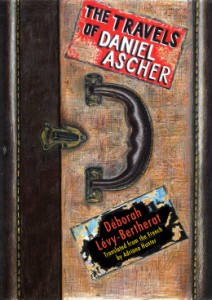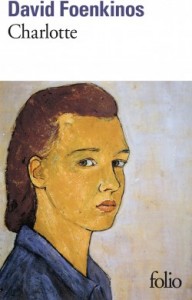The Travels of Daniel Ascher by Déborah Lévy-Bertherat (in translation) & Charlotte by David Foenkinos (in French)
 As a YA book in translation, Lévy-Bertherat’s novel is a great introduction for young readers to some aspects of French culture; names full of accents and hyphens, places both within Paris and without, and the complex history of the Holocaust in France, and in particular that of the fictional Roche family. It also includes a somewhat common YA trope: Growing up means learning that life is more complicated than you realized as a child.
As a YA book in translation, Lévy-Bertherat’s novel is a great introduction for young readers to some aspects of French culture; names full of accents and hyphens, places both within Paris and without, and the complex history of the Holocaust in France, and in particular that of the fictional Roche family. It also includes a somewhat common YA trope: Growing up means learning that life is more complicated than you realized as a child.
Our protagonist Hélène is a new student at a university archaeology program in Paris. It becomes quickly clear that her choice of study is her passion as she applies the rigor of her field to an investigation of the mysterious history of her great uncle, Daniel. Hélène’s view of Daniel changes slowly as she uncovers the true story of his past as a small child from a Parisian Jewish family persecuted during World War II. He transforms from the quirky uncle she’s always viewed as a bit childish to a close member of her family who she hopes to get to know more.
Lévy-Bertherat’s story is full of hidden history that unravels and characters who travel the world, including the world of one’s imagination. Her novel is accompanied by black and white sketches that give the reader a sense of the spaces that Hélène inhabits and the objects she encounters in her search for the truth about her family. This sense of persistent searching was one of my favorite parts about the story; the protagonist continues even when she is told to give up, and she learns far more than the rest of her family would have wanted–had they known the truth themselves.
 Foenkinos’s Charlotte is one of those biographies that’s not a biography, a novel that’s not really a novel. The author’s personal obsession with the real-life painter Charlotte Salomon means that he inserts himself into the narrative on occasion, as he visits the places Charlotte lived and wonders about the faded interest in her autobiographical masterwork Life? or Theatre? There is no doubt that this is a sad story of life lost in the middle of a horrible war where millions of souls were extinguished, but Foenkinos’s goal seems to be making Charlotte accessible to those who have never heard of her work or her tragic story–a beautiful gift to her memory.
Foenkinos’s Charlotte is one of those biographies that’s not a biography, a novel that’s not really a novel. The author’s personal obsession with the real-life painter Charlotte Salomon means that he inserts himself into the narrative on occasion, as he visits the places Charlotte lived and wonders about the faded interest in her autobiographical masterwork Life? or Theatre? There is no doubt that this is a sad story of life lost in the middle of a horrible war where millions of souls were extinguished, but Foenkinos’s goal seems to be making Charlotte accessible to those who have never heard of her work or her tragic story–a beautiful gift to her memory.
It is perhaps because I read this book in French that I found the author’s particular style of prose to be quite apt for this project. He has written a novel as if it were free verse. Each line of text is its own sentence, and each sentence is its own line. I have read elsewhere that this approach was not well received, but it became clear to me after a few pages that the succession of thoughts printed on the page were indeed individual ideas unrolling one after another. Stop. Go. Stop. Go. Next. Next. Next.
The blend of fiction, fact, and self-reflection on the part of the author made for a moving story of a young girl surrounded by the tragedy of suicide within her family and state-sponsored hatred in her country. She touches on love in her short life, both of passionate and comforting natures. She excels as a painter, a genuine natural talent. But the war and the Final Solution cut her down just as she’s realizing how talented she is. And Foenkinos conveys genuine disappointment in the moments when he becomes a character in the text as he emphasizes the ways in which Charlotte is forgotten by most of society–although he does discover a few people along the path she traveled who light up at the mention of her name.